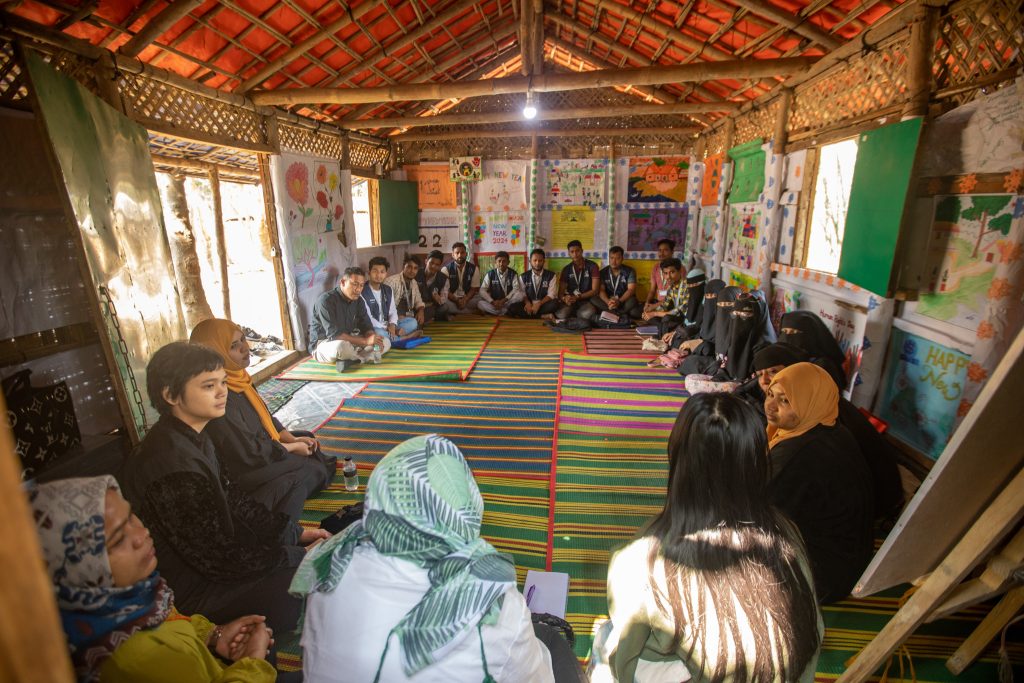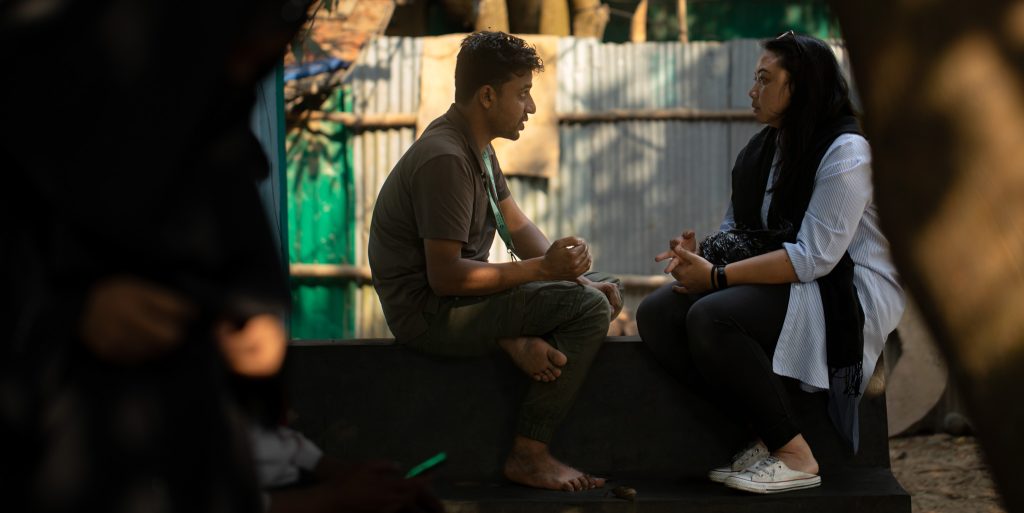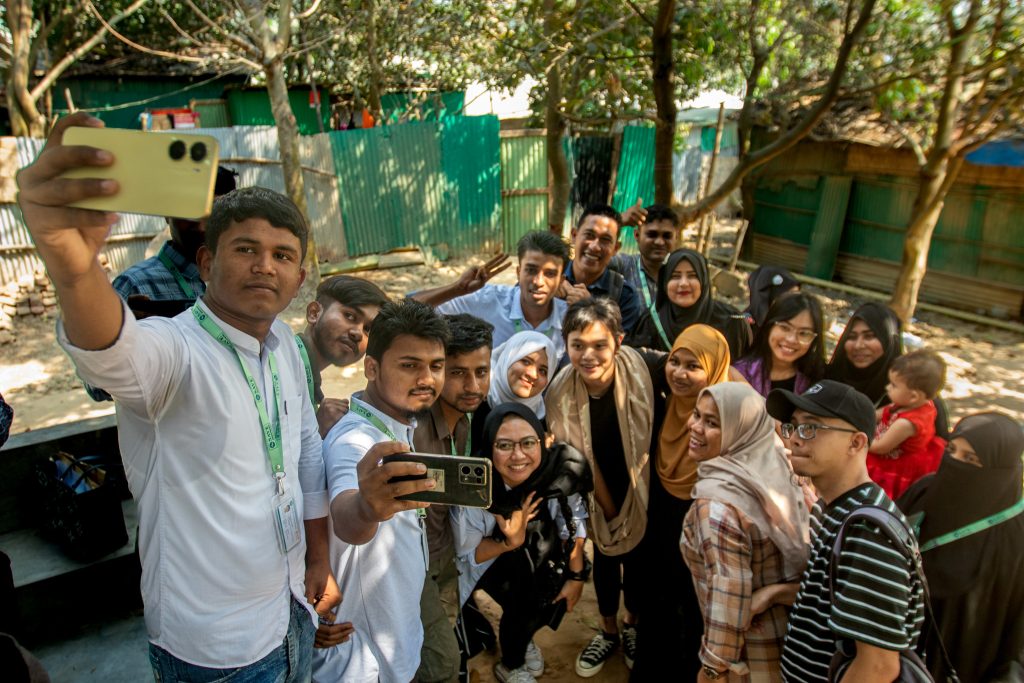
For years, Rohingya refugees have risked their lives on perilous sea journeys from Myanmar and Bangladesh, desperately seeking safety and a chance for a better future. However, the situation has become even more dire in the last weeks of 2023 and early 2024. Since mid-November 2023, 13 boats carrying 1,964 refugees – mostly women and children – have reached Aceh and North Sumatra, Indonesia, in a sharp increase of arrivals.
While many Indonesians remain welcoming and sympathetic to the challenges facing Rohingya refugees, there has been a wave of coordinated negative sentiments whose origins are unclear. Which sadly led to hostility, including the use of force from local communities, threats of deportation and eviction from shelters led by student movements, and increased border patrols led by Indonesian authorities in conjunction with local fishermen.
As a response to this development, in March 2024, Asia Justice and Rights together civil society organisations (CSOs) based in Aceh, Indonesia departed to Cox’s Bazar, Bangladesh – home to one of the world’s largest refugee camps. The visit sought to bridge understanding among countries sharing responsibilities to provide protection for people fleeing violence in the region. Representatives from Geutanyoe Foundation, KontraS Aceh, and SUAKA – The Indonesian Civil Society Network for Refugee Rights Protection exchanged firsthand insights into the lives of Rohingya refugees in the weeklong visit, exploring how their experiences in Cox’s Bazar and counterpart in Aceh could inform regional solidarity and advocacy efforts.
This marks the first time that civil society from Indonesia have the opportunity to visit Cox’s Bazar and interact with refugees residing in the camps in Kutupalong area. Since March 2019, AJAR has partnered with Bangladesh’s Liberation War Museum, working alongside Rohingya women and men through targeted programs.
Quilting Solidarity, from Indonesia to Bangladesh
The Acehnese activists, alongside Rohingya facilitators and communities, spent a week mapping a collaborative response to the crisis. Azharul Husna of KontraS Aceh, shared that from the documentation recorded by her organisation, the first boat carrying refugees landed in January 2009, and the passengers were initially referred to as “boat people” by the locals. Only later was their identity as Rohingya refugees confirmed. Rohingya arrivals in Aceh used to be sporadic, happening about once or twice a year. However, the 2021 Myanmar military coup triggered a tragic increase – with arrivals now happening anywhere between three and nine times annually.

Decades-long tradition of peumulia jamee (honouring guests) defines Aceh’s approach to Rohingya refugees, according to Al Fadhil of Geutanyoe. Their customary maritime law, panglima laot, compels fishermen to aid those in distress at sea. This law, rooted in Sharia principles like much of Aceh’s customary law, made the area a rare place of welcome for the predominantly Muslim Rohingya.
As made apparent through the discussions, communities and civil society organisations rush to help each Rohingya boat that arrives. Unfortunately, disinformation about Rohingya camps in Cox’s Bazar was rampant on social media. This misinformation fuels anti-refugee sentiment, making the work of Aceh’s civil society groups to provide food, water, medical care, and shelter even harder.
“Misinformation designed to exploit refugees for political gain is everywhere,” says Azharul Husna of KontraS Aceh. “The idea that Rohingya enjoy a good life in Bangladesh is a dangerous lie. The hardships they face – both in Cox’s Bazar and in Aceh – reflect their desperation. Our journey is about seeking truth to counter these lies.”
Jayanti Aarnee Baskoro of SUAKA shared a broader perspective: the rapid increase of Rohingya boats arriving in Indonesia signals that the desperation of stateless Rohingya refugees has also increased. They continue to face persecution in Myanmar and are therefore forced to seek refuge in neighboring countries. Through this exchange, she herself saw how life in the camps offered limited opportunities to build their future and conditions of increased uncertainty.
Apart from meeting the basic and emergency needs of refugees, the discussions also reveal the facts that Rohingya refugees consist of many vulnerable people. Support system is needed to ensure psychosocial counseling, empowerment especially for survivors of gender-based sexual violence and special protection for children.
An Earnest Plea of Help and Protection
What will become of these Rohingya refugees? The question lingered as Fadil, Azharul, and Jayanti departed Aceh in the beginning of their journey. Three days and thousands of kilometers later, a connection emerged – a Rohingya woman’s handwritten note from a distant camp. It carried a simple, yet urgent plea for help and protection.

With the prospect of a safe return to Myanmar remains distant for Rohingya refugees, they deserve a place where they can build a safe and dignified life with their families. As the arrival of more boats becomes more likely, the situation of Rohingya refugees must be a concern to all countries in the region. The region as a whole must address the root causes that are pushing Rohingya refugees to leave Bangladesh and preventing them from returning to Myanmar.
At the end of the visit, AJAR and the CSOs visited the Rohingya Cultural Memory Center, which is fully managed and taken care of by the communities there. They saw firsthand the culture and heritage of the Rohingya people and listened to explanations of Rohingya’s rich history of music, art, farming, and seafaring traditions. The Center empowers the Rohingya to document and preserve their heritage – an approach that could be valuable in Indonesia as well.
As the civil society organisations return home to Aceh, Indonesia, they will be back to a country that currently hosts 12,805 refugees from 51 countries, including approximately 8% who are Rohingya. All these numbers can become numbing, but behind the statistics are individual Rohingya men, women, and children that each carries unique stories, hopes, and fears. By learning from the experiences of Indonesia and Bangladesh, a response can be made based on our shared humanity, upholding the fundamental right to a dignified life for all.
